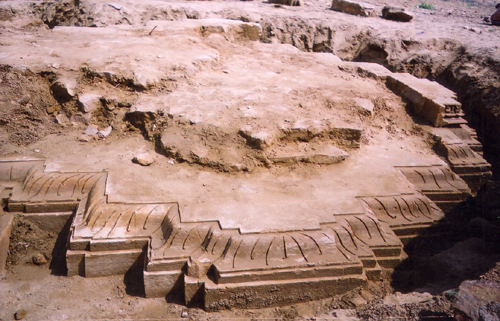Photo


Formerly called Lodravapur after the Lodra Rajputs, the site is associated with the folk lore of Mahendra and Mumral. Lodruva was the earlier capital of the Bhatis. Mahmud Ghazni, on his way to Somnath during the eleventh century A.D. had captured it. Subsequently, Vijayaraja, Bhojadeva and Jaisal ruled from here and the last ruler found it not a proper and safe place for defence, so he laid the foundation of the fort and city of Jaisalmer after A.D. 1163. Remains of a tenth century ornate sandhara temple, consisting of a pancharatha gudhamandapa have survived at the site. The temple was reconstructed in the later centuries and in under worship. In 1985 about a dozen stone sculptures were recovered from the site of various Hindu deities, besides some architectural fragments, datable to circa tenth-eleventh century A.D. These are now preserved in the State Museum, Jaisalmer.
| Notification No. | Act No. LXXI of 1951 dated 28.11.1951 |
| Notification in PDF | |
| Ownership Status | Government |
| Topographical Features | Rocky area covered with sand dunes. |
| 1 | Chandramani Singh (ed.), Protected Monuments of Rajasthan (Jaipur 2002); |
| 2 | K.C. Jain, Ancient Cities and Towns of Rajasthan (Delhi 1972); |
| 3 | K.K. Sehgal (ed.), Rajasthan District Gazetteers, Jaisalmer District (Jaipur 1973); |
| 4 | M.A. Dhaky (ed.), Encyclopaedia of Indian Temple Architecture, North India, Beginning of Medieval Idioms (Delhi 1998) and |
| 5 | P.K. Trivedi ‘Excavated Sculptures from Lodruva, Jaisalmer, Shodh-Sadhana Yr. 9 No. 8 (Sitaman 1988). |
| Locality | Tehsil | District | State |
| Lodruva Patan | Jaisalmer | Jaisalmer | Rajasthan |
District


 By Air : Jodhpur
By Air : Jodhpur By Bus : Lodruva Patan
By Bus : Lodruva Patan By Train : Jaisalmer
By Train : Jaisalmer